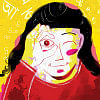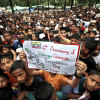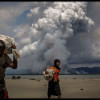Preserving hope
The world we live in has been torn apart by wars and internal domestic conflict. The twenty-first century has seen human suffering and forced displacement, from new wars and old, in almost every corner. While armed forces battle it out, whether over lines on a map, natural resources under the ground, minor ethnic differences, or irreconcilable religious conflicts, the victims are one and the same – innocent people who lose their lives or who leave their homes behind to flee to unknown territory to pass their days in uncertainty and often in destitution.
There is now a staggering 60 million people in the world today who are forcibly displaced from their homes. Sixty million people like you and me are bereaved from their loved ones, separated from their family members, uprooted from their land and livelihoods, torn from their social fabric and tossed into the dark pit of despair. Among these suffering victims of conflict and discrimination, almost half are children, and half are female. The trauma that each refugee suffers, is an experience that we must work collectively to end, for the generations that come after us. The human race has reached unprecedented heights of material and technological development – in this age of advancement, we should unite to find a solution for those of us who continue to suffer meaningless losses. Peace and progress must be shared – only some cannot reap benefits while others suffer.
But while we wait for the solutions to come and for wars to finish, we must remember those whose lives have been halted by their displacement to new places. While the 60 million displaced persons cannot return to their homes by choice, there are some 15 million among them who have been furthermore displaced across an international border and therefore are 'refugees' as defined by international law. Lives of refugees are an example of an opportunity wasted, because their activities are reduced to the mere act of survival, and they are not given the chance to be productive, contributing citizens. This is not only a loss for the hosting country, it is a grave injustice to the refugees. Today I would like to ask you to share cause with refugees, and recognise the incredible courage they display on a daily basis. Refugees, as I have seen them in my 20 year career, possess incredible strength and resilience, and face each day with more determination than the rest of us. Through their plight and fear, they preserve their hope – they go on without giving up, and we can recognise their situations by being their champions, and lend our voices to end their distress.
UNHCR is working in 126 countries around the world today, where refugees who are spending each day with the hope that their lives would change, and they can build a home and a dignified life somewhere. While we cannot truly share their trauma, we can do what is within our capacity – to reassure them that we are #WithRefugees, and we can advocate for humanitarian support until solutions are found. Once a refugee is not always a refugee – with resolve and political will, we can find solutions for them, and UNHCR has helped more than 50 million refugees restart their lives.
UNHCR has worked in Bangladesh, for more than 23 years, supporting an extremely marginalised group of refugees – the Rohingya – whose complex history of denial of citizenship and persecution demands a multilateral, pragmatic solution that is befitting of this new era of democracy in Myanmar. There are some 33,000 Rohingya refugees registered in Bangladesh, and living in Kutupalong and Nayapara refugee camps in Cox's Bazar. UNHCR provides protection and assistance in line with minimum emergency standards even though their residence is protracted, and there are no prospects for any durable solutions. This has rendered the refugees' lives extremely vulnerable, and restrictions on movement, schooling, employment and technology access have isolated the Rohingya into a life of darkness. Some families are living in such utter destitution that they adopt negative coping mechanisms to survive, at the risk of their own and their families' well-being.
Rohingya from Rakhine State of Myanmar have been displaced for decades, which leads to hopelessness and frustration due to lack of political or socioeconomic prospects either in Bangladesh or back in Myanmar where they do not enjoy citizenship. The desperate and static conditions of refugee life in Bangladesh has motivated some refugees to take dangerous boat journeys to Thailand and Malaysia and beyond, hoping for a better future. These irregular movements expose vulnerable refugees to ruthless smugglers and human traffickers.
The government estimates that an additional 300,000 to 500,000 ethnic Rohingya are living in Bangladesh without registration. They are regarded simply as migrants and sometimes detained for illegal entry. The government is presently enumerating these people in a Rohingya headcount. While effectively of a similar profile to the camp refugees, these unregistered Rohingya comprising 90 percent or more of the Myanmar population in Bangladesh are living in a protection void and have enormous - undocumented - needs for legal and humanitarian assistance. Other challenges to the condition of Rohingya in Bangladesh include "pushbacks" which continue on the Bangladesh-Myanmar border, challenging international law. There are also worrying new reports of armed elements involved in drugs and human trafficking operating in the camps. These problems require a strong response from both the Government and its partners including UNHCR and NGOs.
UNHCR has been providing 'international protection' to the world's refugees for over 65 years now. The start of the 21st century has seen UNHCR help with major refugee crises in Africa, the Middle East and Asia. Our organization is still hard at work, protecting and assisting refugees and while it takes a small effort, your solidarity goes a long way to shape the global agenda on ending refugee crises. Don't stay back – learn, engage and support. On this commemoration of World Refugee Day, I want to remind ourselves that the voices of every one of us, is important to strengthen the protection of refugees globally. Let us take action and remind them that we are #WithRefugees.
Pledge your support today at www.refugeeday.org.
The writer is the UNHCR Representative in Bangladesh.

 For all latest news, follow The Daily Star's Google News channel.
For all latest news, follow The Daily Star's Google News channel. 








Comments